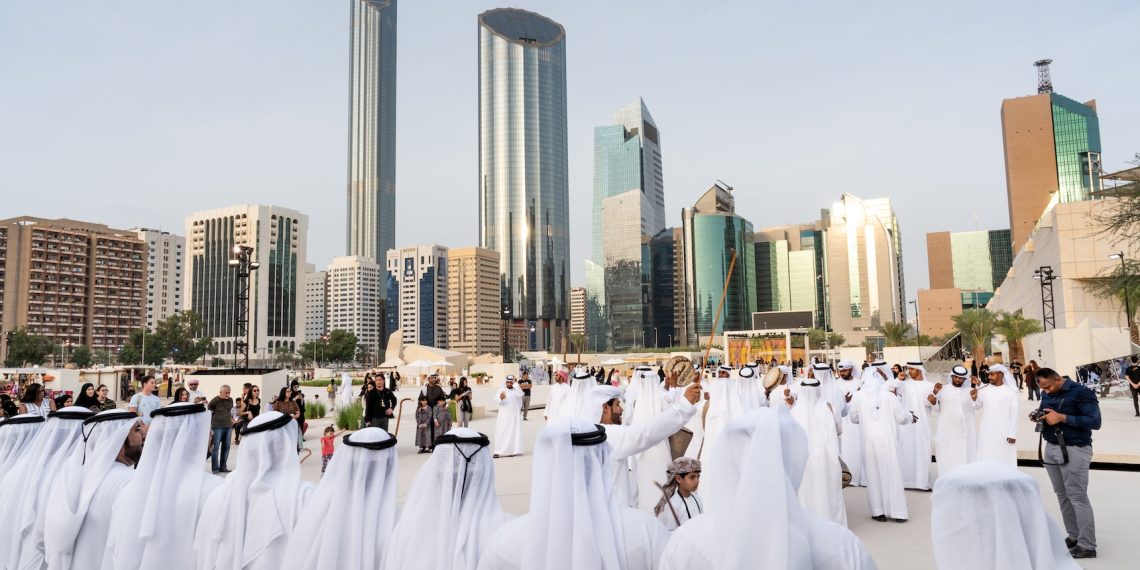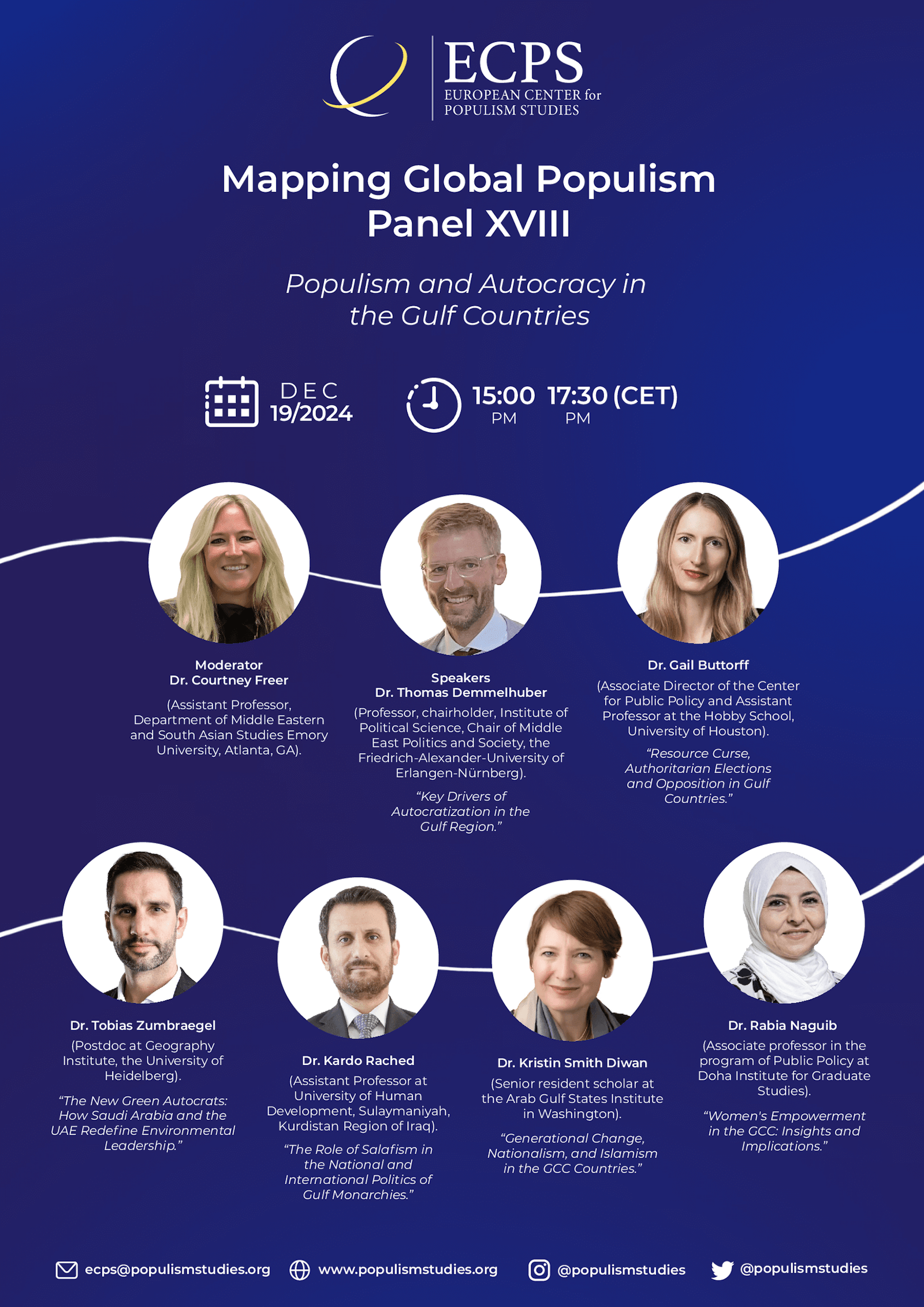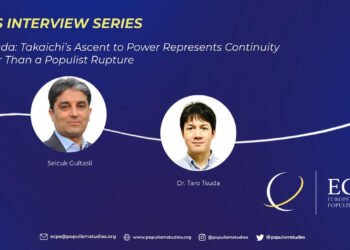Date/Time: Thursday, December 19, 2024 — 15:00-17:30 (CET)
Click here to register!
Moderator
Dr. Courtney Freer (Assistant Professor, Department of Middle Eastern and South Asian Studies, Emory University, Atlanta, GA).
Speakers
“Key Drivers of Autocratization in the Gulf Region,” by Dr. Thomas Demmelhuber (Professor, Chairholder, Institute of Political Science, Chair of Middle East Politics and Society, the Friedrich-Alexander-University of Erlangen-Nürnberg).
“The Evolving Social Contract in the GCC,” by Dr. Gail Buttorff (Associate Director of the Center for Public Policy and Assistant Professor at the Hobby School, University of Houston).
“The New Green Autocrats: How Saudi Arabia and the UAE Redefine Environmental Leadership,” by Dr. Tobias Zumbraegel (Postdoc at Geography Institute, the University of Heidelberg).
“The Role of Salafism in the National and International Politics of Gulf Monarchies,” by Kardo Kareem Rached (Assistant Professor at University of Human Development, Sulaymaniyah, Kurdistan Region of Iraq).
“Populism in Gulf Monarchies: Suppression, Cooptation, Adoption,” by Dr. Kristin Smith Diwan (Senior resident scholar at the Arab Gulf States Institute in Washington).
Click here to register!
Brief Biographies and Abstracts
Dr. Courtney Freer is Assistant Professor of Middle Eastern Studies at Emory University and Senior Fellow at Emory’s Center for the Study of Law and Religion. She previously served as Assistant Professorial Research Fellow at the Middle East Centre at the London School of Economics and Political Science (LSE) between 2015-2021. Courtney’s academic work focuses on the domestic politics of the Arab Gulf states, particularly the political role of religion, and Islamism more broadly. She received her DPhil in Politics from the University of Oxford in 2015, having written a thesis examining the socio-political role played by Muslim Brotherhood groups in Kuwait, Qatar, and the United Arab Emirates (UAE). The findings of this work were published by Oxford University Press in 2018 as Rentier Islamism: The Influence of the Muslim Brotherhood in Gulf Monarchies. She previously worked at the Brookings Doha Center in Qatar and the US-Saudi Arabian Business Council in Washington, DC, and holds a BA in Near Eastern Studies from Princeton University and an MA in Middle Eastern Studies from The George Washington University.
Key Drivers of Autocratization in the Gulf region
Dr. Thomas Demmelhuber is Professor of Middle East Politics and Society at the Friedrich-Alexander-University Erlangen-Nürnberg (Germany) and visiting professor at the College of Europe (Natolin). He has been researching the Middle East and its transregional entanglements for more than two decades. He has lived and worked in different countries with substantial field work experience all across the region. As PI and Co-PI he has so far been awarded more than EUR 5 Mio. in research grants. Demmelhuber has advised different German ministries, the European Parliament (Subcommittee on Human Rights) and various foundations. He is serving in different scientific advisory councils, e.g. of the German Institute for International and Security Affairs in Berlin (SWP) or the German Orient-Institute in Beirut (Max Weber Foundation). Demmelhuber is also board member and Hon. Secretary of the German Middle East Studies Association. Demmelhuber publishes regularly in leading international journals (e.g. Democratization, Third World Quarterly) and has published/edited numerous books, for example: The comprehensive volume on Authoritarian Gravity Centres: A Cross-Regional Study of Authoritarian Promotion and Diffusion (co-authored with Marianne Kneuer, Routledge 2020, paperback 2021) presents cutting-edge findings on the international dimension of authoritarianism.
Abstract: There is a scholarly consensus that the countries of the Arabian Peninsula – particularly the Gulf monarchies – exhibit a clustering of autocratic governance. However, it would be fundamentally wrong to perceive this regime type as static. Gulf politics is instead shaped by dynamic and vivid discourses, including domestic debates on regime consolidation (that go well beyond pertinent factors like repression, cooptation et al.), regional efforts to forge a shared regime identity, and international networks that facilitate the diffusion of autocratic practices, ideas, and norms. While structural factors, such as shifts in the international order, play a role, I try to argue in my talk that the primary drivers of autocratization must be understood through the actions and perspectives of individual actors, i.e. the politically relevant elite.
Resource Curse, Authoritarian Elections and Opposition in Gulf Countries
Dr. Gail Buttorff is Research Associate Professor, Hobby School of Public Affairs Associate Director, Center for Public Policy. Dr. Buttorff joined the Hobby School as a Visiting Assistant Professor in 2017. She holds a Ph.D. and M.A. in Political Science from the University of Iowa. Her research interests focus on elections and gender and public policy in the Middle East and Gulf Cooperation Council countries, quantitative and survey methodologies. She is the author of Authoritarian Elections and Opposition Groups in the Arab World. Her work as also been published by Electoral Studies, Journal of Theoretical Politics, and by the Baker Institute for Public Policy, among others.
The New Green Autocrats: How Saudi Arabia and the UAE Redefine Environmental Leadership
Dr. Tobias Zumbrägel is a senior researcher and lecturer at the department for Human Geography at Heidelberg University. Prior to this, he worked at the center for excellence Climate, Climatic Change and Society (CLICCS) at the University of Hamburg where he is an associate fellow. He studied History, Political Science and Middle Eastern Studies in Cologne, Tuebingen and Cairo. and holds a Ph.D. from the Friedrich-Alexander University Erlangen-Nuremberg. Zumbrägel is the author of Political Power and Environmental Sustainability in Gulf Monarchies (Palgrave 2022). His main research focuses on questions of legitimacy, power and state authority in the Middle East with a special interest in Political Ecology, Energy Policy, Sustainability and Political Economy.
Abstract: Especially Saudi Arabia and the United Arab Emirates are leveraging sustainability transformations as strategic tools to enhance domestic legitimacy and project international influence, promoting a model of ‘soft’ authoritarianism. By diversifying energy portfolios and positioning themselves as influential players in global climate policy, both countries aim to foster public consent and strengthen internal regime support. Internationally, they pursue outward-oriented legitimacy by aligning with Western sustainability ideals while collaborating with other authoritarian states to diffuse this model, particularly in developing countries. Through flagship initiatives like Saudi Arabia’s NEOM, the Middle East Green Initiative, and the UAE’s Masdar City, they serve as role models for sustainable development within an authoritarian framework. This approach blends environmental innovation with a new form of governance, advancing their soft power on the global stage.
The Role of Salafism in the National and International Politics of Gulf Monarchies
Kardo Rached is a lecturer at the University of Human Development UHD—Sulaimany and Dirctor of the Quality Assurance at UHD. He is also manager of the Turkish Studies Unit at Sbay Research Center – Sulaimany. He has published various articles, most recently: "State-Reconstruction: Iraq after ISIS as a Case Study." Analecta 13.25 (2023); "Financing of non-state armed groups in the Middle East: Iraqi Popular Mobilization Forces (PMF) as a case study." Studies in Conflict & Terrorism (2022): 1-26; "Institutionalizing the Salafi Thoughts by the State: The Saudi Salafism as a Case." Trames 25.2 (2021): 239-255; "United States: A Review of the US Middle East Policy from Harry Truman to Bill Clinton." (2021); "Post-ISIS Era and the State Dissolution in the Middle East: Iraq as a Case." Academic Journal of Interdisciplinary Studies (2020); "Post-ISIS Iraq and the Shia Armed Groups." Central European Journal of International & Security Studies 13.1 (2019); "Article Review of Islamic Mobilization: Social Movement Theory and the Egyptian Muslim Brotherhood." Canadian Social Science (2018); "Public diplomacy effort across Facebook: A comparative analysis of the US consulate in Erbil and the Kurdistan Representation in Washington." Sage Open 8.1 (2018); "The Likelihood of a Durable Peace and Longstanding Stability in an Integrated Iraq in the Aftermath of the Military Defeat of the Islamic State (IS) Group." The Journal for Interdisciplinary Middle Eastern Studies 3 (2018): 73.
Populism in Gulf Monarchies: Suppression, Cooptation, Adoption
Dr. Kristin Diwan is a senior resident scholar at the Arab Gulf States Institute in Washington. Her current projects concern generational change, nationalism, and the evolution of Islamism in the countries of the Gulf Cooperation Council. Recent publications include "The New Industries: Tourism and Entertainment in a Changing Saudi Arabia," in Sfakianakis, ed, The Economy of Saudi Arabia in the 21st Century (Oxford, 2024) and "Clerical associations in Qatar and the United Arab Emirates: soft power competition in Islamic politics," International Affairs, 97.4 (2021): 945–963. Diwan was previously an assistant professor at the American University School of International Service and has held visiting scholar positions at the George Washington University and Georgetown University. She received her PhD from Harvard University.
Abstract: Gulf monarchies are not immune to the global rise in populist movements, despite their wealth and generous welfare systems. The adoption of austerity measures alongside the growing concentration of wealth in the hands of political and business elites is fueling a populist response, visible on social media and in Gulf parliaments. In this talk I will look at examples of populist opposition and how royal leadership is countering it, through suppression, cooptation, and the adoption of populist rhetoric to advance their own ruling agendas.



